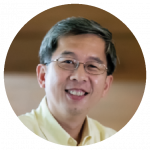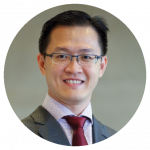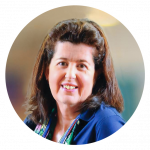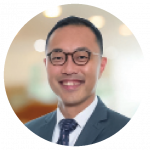Celebrating Our Teachers – They Who Teach Also Learn
Our educators have been the cornerstone of the NUS Yong Loo Lin School of Medicine since its founding 115 years ago. Vice-Dean for Education, Assoc Prof Lau Tang Ching, examines what it means to learn and teach in this day and age (of a pandemic), while the four Assistant Deans for Education—Assoc Prof Alfred Kow, Assoc Prof Marion Aw, Assoc Prof Marie-Veronique Clement and Dr Chen Zhi Xiong—share their hopes for healthcare education this year, eureka moments and what keeps them going.

Associate Professor Lau Tang Ching
Vice-Dean, Education, NUS Medicine
The COVID-19 pandemic has taught us many things: one of which that continues to resonate strongly with me is the increasing relevance of NUS Medicine’s vision: “Inspiring Health for All”. Indeed, for us to emerge from the pandemic with fewer infections and deaths, and to prevent the next one from ravaging the world as badly as the current one, we need to revamp our healthcare system to create one that is less disease-focused, more emphatic on health promotion and disease prevention. Therefore, one of my hopes is that every one of us will take on a new identity, and collectively embody a people who will inspire health—within ourselves, our families, our community and beyond.
Another lesson that I have learnt is that not one single person or single profession or specialty can tackle the COVID-19 pandemic on our own. It will take inter- and trans-professional collaboration for better control of the pandemic and prevention of the next one. The value of a “generalist-specialist” training is thus ever more important today—each of us needs to be trained well in one skill, but also have the ability to learn and integrate skills in other domains and professions within our lifetime.
The way to achieve this capability is to continue learning throughout our working life. For example, we could live our lives in eight-year cycles. During the first two years, learn a new skill. Over the next five years, integrate that new skill with your old ones and create a new solution for a difficult problem, working with a team of people from other professions as you do so. Finally, in the last year of the cycle, pass on the project to someone else so that you are subsequently free to pursue the acquisition of yet another new skill. As each of us will have four to five such eight-year cycles in our lifetime, the potential for us to learn and integrate new skills and knowledge is immense.
Finally, COVID-19 also reminded me that even as we create new knowledge and solutions, and as we become more technologically enabled, one human attribute will always be important, especially in the post-COVID-19 world: empathy. Let us continue to take time to listen to one another with an open heart, show compassion and kindness, and help one another during this period. Cheers.

Associate Professor Alfred Kow
Assistant Dean (Education), NUS Medicine
Senior Consultant, Division of Hepatobiliary & Pancreatic Surgery, Department of Surgery, University Surgical Cluster, NUH
Senior Consultant, Liver Transplant Programme,
National University Centre for Organ Transplantation (NUCOT), NUHS
Senior Consultant, Division of Surgical Oncology,
National University Cancer Institute (NCIS), NUHS
I hope that healthcare education will have a boost in its digital transformation to accelerate the adoption of technology in medical education at NUS Medicine. Due to the COVID-19 pandemic, we have experienced a significant disruption to how medical education is conducted. While everyone in the School works tirelessly to quickly transform the curriculum to adapt to the changes and impact of the pandemic, we are very encouraged to see the great change in the mindset of our faculty members in adopting technology in medical education. This has been true in my case, starting from learning how to use Zoom and Microsoft Teams to conducting interactive teaching sessions online, to the introduction and implementation of a virtual reality (VR) game in patient safety training, to consolidating of iPad games to teach healthcare economics. I hope to continue to see the faculty members in our School actively adopt technology in healthcare education.
My most recent eureka moment happened very recently where we introduced the VR game called PASS-IT. Due to the COVID-19 pandemic, the operating theatre (OT) was out of bounds to medical students. Students are not allowed to enter the OT as it is considered a high-risk area for COVID-19 infection (as there is a potential risk of exposure during airway manipulation and aerosol generating procedures). The introduction of the PASS-IT game (PAtient Safety in Surgery – as Interprofessional Training) has been very timely as we could use the VR game to train medical students on patient safety aspects in the OT. This is a unique game that allows medical students to learn about patient safety in surgery and anaesthesia, and for dentistry students to learn about safety aspects in dental procedures. The immersive experience for the students was found to have significantly improved their level of understanding of patient safety
The most rewarding aspect of my work is to see that the students learn well and mature into competent doctors. Over the years, I have spent a large proportion of my time and effort in growing healthcare education in NUS Medicine, on top of my work as a surgeon. While it is extremely rewarding to help my transplant patients receive a new lease of life subsequently, teaching our budding medical students well and watching them mature into good doctors are other rewarding aspects of my work. Medical education and training are crucial for the future of the healthcare system. When we continue to invest a great deal of our efforts in training them, we not only impart skills and knowledge to the next generations of doctors: I am also able to multiply my ability to help other patients. One person can help in a limited manner, but when we teach and train the future generations of doctors well, we ensure that more of our patients will benefit from them. I never compromise on the opportunity to teach our students. That has always been a great motivation to keep me going, despite the hectic clinical work schedule (which can involve an overnight liver transplantation and long surgeries), research activities and administrative duties.

Associate Professor Marion Aw
Assistant Dean (Education), NUS Medicine
Head and Senior Consultant, Division of Paediatric Gastroenterology, Nutrition, Hepatology and Liver Transplantation, Department of Paediatrics, Khoo Teck Puat – National University Children’s Medical Institute, NUH
COVID-19 has made us rethink how we can deliver healthcare education in the light of restricted clinical exposure for students. We have experienced the advantages of having a standardised campus-based curriculum for all our students, regardless of which hospital they have been posted to. This campus-based curriculum has been delivered through in-person web lectures, videos and various online learning tools, as well as standardised patients.
Whilst clinical learning is best done at the bedside with patients, it is critical that we better prepare our students to maximise their learning from each clinical encounter, especially given their reduced clinical exposure due to the COVID-19 pandemic. Such preparation can be achieved through campus-based teaching. Establishing and reactivating core foundational knowledge prior to interacting with and examining patients, as well as a problem-based approach to various clinical symptoms, will help students to learn better experientially.
As teachers, we see our role as helping students develop their analytical skills and “join the dots”, so to speak. But therein lies an important point—students need to have sufficient “dots” in order for teachers to help them “make sense” of the dots and join them. The campus-based curriculum plays a key role to help create and join those dots, and there should be adequate time allocated in the formal academic timetable for students to receive and process this campus-based curriculum, regardless of how it is delivered. It is my hope that the useful aspects of our campus-based curriculum will thus be retained during subsequent academic years.
I don’t think I have had “eureka” moments in overcoming challenging problems, however these are some things I have learnt over the years:
Firstly, the importance of failure, and that we are “no less” a person when we fail. Most of us are averse to failure, and I must admit, that this “fear of failure” is sometimes what drives me to over-prepare (i.e., be OCD). However, experiencing failure at some point in life is inevitable. Often it is learning from failure that makes us better, by building resilience and tenacity. At the same time, we need to provide a safe space for our trainees and students to experience failure, and to support them in overcoming these painful experiences and setbacks.
Secondly, the importance of not over-stressing trainees/ junior learners in our attempt to “stretch” them. There is sometimes a fine line between challenging a learner, and stretching them beyond what they can cope with. There are two categories of learners we need to watch out for: There are the brilliant and capable ones who do not know how or when to say “no”, and potentially risk being burnt-out and overcommitted in their attempt to excel and succeed. At the other end are the learners who struggle, hesitant to seek clarification and demoralised every time they cannot answer a question.
Thirdly, empathy. As clinicians we are taught to empathise with our patients, and I believe most of us do so. However, we also need to be able to put ourselves in the shoes of our students and trainees. To better understand how they think, feel and what makes them tick. This aspect for me is still a WIP (work in progress).
As a clinician educator, there are two key motivators that keep me going:
One, when I “solve challenging clinical problems”, my patients get well and those with chronic disease have their conditions under control—I get immense satisfaction and joy from that. The gift of being in a profession that can have a profoundly beneficial effect on people’s lives is something I would like all our students and trainees to appreciate and commit themselves fully to.
Two, when I teach my students and trainees and they “get it”. Also, when juniors and trainees whom I mentor or supervise do a good job, look after their patients well, and are successful in their own career… there is no greater pleasure for an educator than to see that.

Associate Professor Marie-Veronique Clement
Assistant Dean (Education), NUS Medicine
Associate Professor, Department of Biochemistry, NUS Medicine
I hope we never forget that an integral component in healthcare education is “care”.
As educators, I hope to stress that caring for oneself and for friends and peers is the key to mastering the art and practice of caring for patients.
A eureka moment would have been easier to share if I was asked the same in my research work. The eureka moment is what drives my excitement about research. Each of my publications originates from an “eureka” moment. The most recent one would be the idea I am articulating through a manuscript currently in preparation.
As the Assistant Dean for Student Affairs, the most challenging problems I am faced with are understanding the motivations and/or circumstances that drive students’ behaviour. Human beings are complex. Students are human beings. Students are complex. An eureka moment would then be better defined as a gradual accumulation of experience gained from the various situations I have dealt with over the years. You might call this experiential insight in dealing with complex and unique subjects.
What my interactions have taught me over the years is that every student is different, every situation is different. There is always more to what meets the eye at first sight. You need to be patient if you want to understand what is hiding behind a student’s poor academic performance, a rebellious attitude or a clear breach of professionalism. Often what is revealed after a few interactions with a student is the sense of insecurity and an inherent mistrust, perhaps due to deep-rooted convictions based on past experiences. A true eureka moment then is to see my efforts bear fruit and the student able to conquer his fears and inhibitions and accept help and guidance to reach his or her full potential.
The most rewarding aspect of my work comes when I receive a genuine “thank you” from a student. Knowing that we guided and accompanied a student to overcome their difficulties. Seeing a student receive their scroll during the graduation ceremony is my best reward. A discreet eye to eye exchange meaning “I know what you have had to overcome to get there” is really what drives me to do what I do. Seeing the student’s happiness and knowing you contributed to it even if in a small way is precious and most rewarding.

Dr Chen Zhi Xiong
Assistant Dean (Education), NUS Medicine
Senior Lecturer, Department of Physiology, NUS Medicine
As technology provides healthcare educators with solutions to make learning possible during COVID-19, we have to ask: what truly transcends beyond the screen? The Internet of things has done a marvellous job of imparting knowledge and skills. However, when it comes to values and attitudes, it is not so clear.
My hope is that values such as respect, compassion and humility will continue to perfuse through screen and cyberspace to touch the heart of every learner and patient. To do this, we will need to equip healthcare educators to deliver ‘heart’ work in their teaching and healing in this new era.
Imagine, if Archimedes was apprehensive about stepping into the tub (e.g. the water was too hot or cold, or the tub was too full); if Archimedes spent his time and energy griping about the displaced water that dirtied his floor; if Archimedes did not follow up after exclaiming “Eureka” (running through the streets naked is not considered a wise follow-up), ‘eureka’ may not have achieved its prominence, let alone the principle of buoyancy.
In short, there is no breakthrough if one, 1) does not step up to a challenge, 2) is consumed by negativity, and 3) does not follow up no matter how brilliant the idea is.
COVID-19 pandemic has posed many challenges. The spark of a eureka moment is no more important than the responses of an individual before and after that moment. At NUS Medicine, I am inspired by my journey alongside many individuals who possess qualities that not only make eureka moments possible but also turn them into lasting changes.
I may have deflected your question but an educator never misses a teachable ‘eureka’ moment.
On the most rewarding aspects of my work: What if the ‘rewarding aspect’ hasn’t manifested yet? Can we still motivate ourselves to keep going? This is a chicken-and-egg conundrum but I believe motivation comes before reward. My question would be “What motivates you to keep going, so that the work may be rewarding?”
The motivation: A sense of purpose.
How can one find this sense of purpose? For me, it had a lot to do with my Christian faith. To students, I would say, “Find it, no matter how long or hard it takes. Never leave home without it.”
I believe that a human’s fundamental need is to feel valued by giving value to another human. As an educator, this value can extend beyond the teaching in the lecture theatre (over Zoom), ward and OT to appear in the form of giving tips (not for exam) to ex-students dealing with future IL (in-law) problems, walking student-couples through strained relationships with their families, listening to crushed career expectations of alumni, journeying with students-parents through conflicts in academic-career-financial aspirations, and navigating students through various identity crises.
The reward: Witnessing individuals pull through and soar, and rejoicing with them.
The privilege to touch and transform lives is available and unique to all of us. To possess this privilege and yet not use it would be regrettable.
Do you wait to see a blossoming plant first before sowing a seed?
